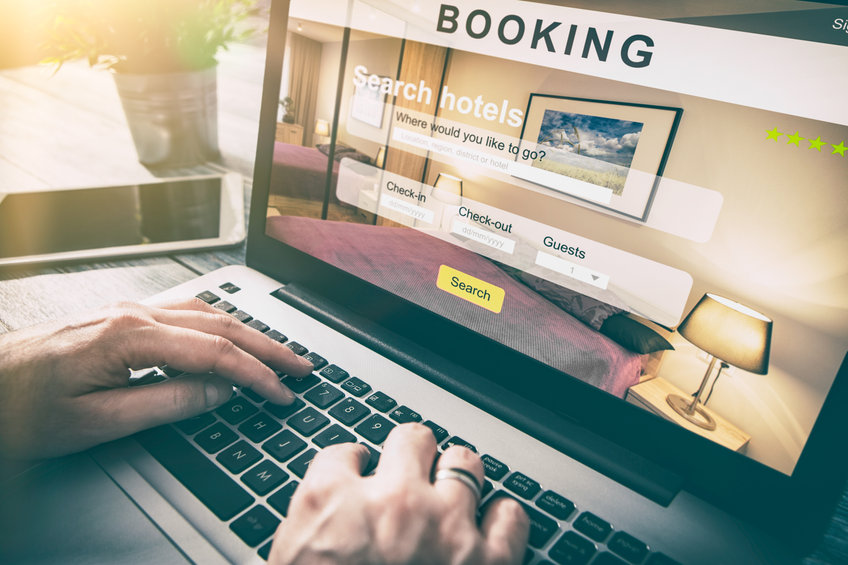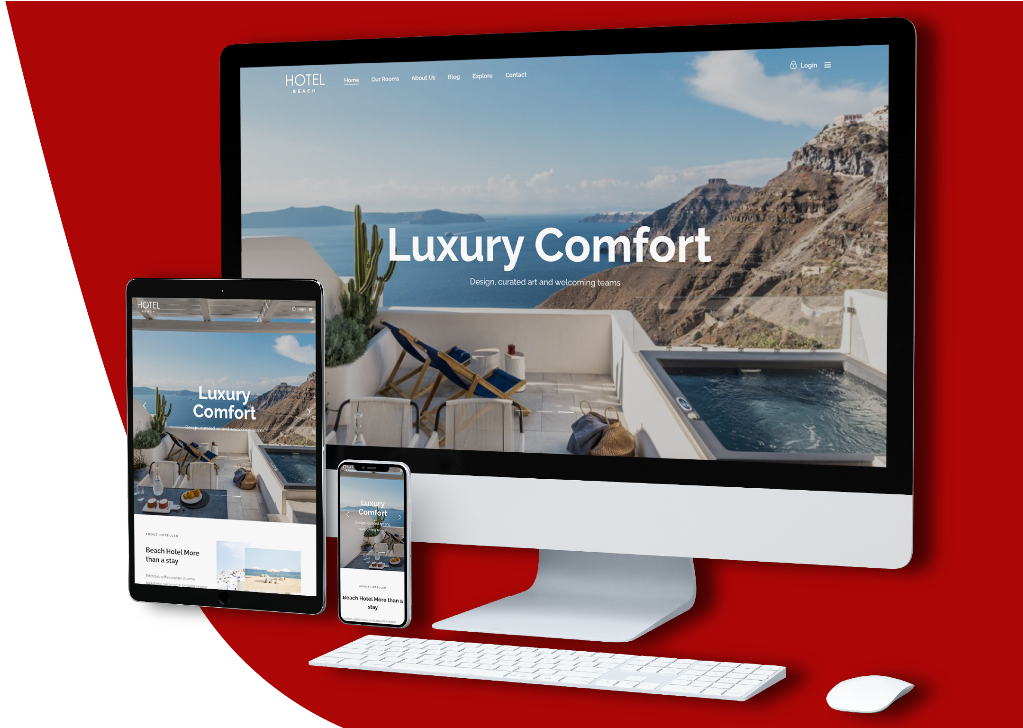More and more consumers are turning to the Internet to make purchases these days, and travel is no exception. However, booking a trip online is very different from buying other products like clothes and electronics. For travelers, there is a lot at stake when it comes to vacations, including money, satisfaction, and leisure time.
Furthermore, a hotel room cannot be refunded if it does not meet expectations. Therefore, travelers tend to be more careful when planning trips, visiting multiple travel websites and comparing prices and options.
To convince travelers to book your property, you need to provide a clear, compelling picture of what they can expect and why their choice is the right one. And that comes from a comprehensive, multi-channel E-Commerce plan.
Expedia and Booking.com are two of the world’s largest e-commerce platforms. So while the internet doesn’t level the playing field, it does give smaller players like small hotels, hostels, B&Bs, and guesthouses plenty of opportunities to capture the business share they need to succeed.
Why E-Commerce is Important for Accommodation Operators
According to Statista, 69% of total revenue from the global travel and tourism market is booked online, accounting for approximately $475 billion in revenue in 2022 and forecast to surpass $521 billion by 2023. Therefore, having a strong presence on e-commerce websites is important because most travelers plan their trips and book on this platform.

E-commerce platforms offer the opportunity to increase visibility and engage travelers at every touchpoint, helping to grow your business. And the great thing is that these sites are available 24/7, so you can take bookings even while you sleep!
But success in eCommerce is about more than just visibility. It’s also about providing an easy booking experience. Today’s guests have higher expectations than ever. Travel sites like Airbnb and VRBO set high expectations in the hospitality industry by allowing travelers to browse destinations and properties, view photos, descriptions, and amenities, make a reservations, and process payments, all with just a few clicks.
11 Hotel E-Commerce Strategies
How can accommodation businesses take advantage of the growing online travel market and attract more bookings? Here, we break down 11 e-commerce best practices and strategies to increase online visibility and create a seamless booking experience.
Optimized for Online Visibility
Before you can convert travelers into guests, you must establish a strong presence on eCommerce websites to build trust and credibility with your target audience. Use the following strategies to optimize your online visibility.
1. Improve your Search Engine Optimization

Improve and optimize search engines
Use search engine optimization (SEO) tactics to increase your rankings and visibility on Google, Bing, and other popular search engines. Make sure your titles, descriptions, and content are optimized with keywords, meta titles, and meta descriptions.
2. Keep online listings up-to-date and consistent
There are many online avenues that can lead to bookings, including Google Business Profile OTA listings, Tripadvisor pages, local travel websites, and destination marketing organization (DMO) websites. Keep these listings complete and up to date, and for SEO purposes, make sure your name, address, and phone number are consistent across profiles.
3. Maintain a multi-channel distribution strategy
A diversified distribution strategy is essential to maximize your online reach. The more sites you are listed on, the more likely travelers will notice your property and visit your website to learn more.
4. Promote your hotel with targeted ads
Develop a search engine marketing (SEM) strategy by exploring paid Advertising options on Google, Facebook, and other Social Media sites. Choose the platform that best meets your marketing goals and budget. Narrow your audience to key target markets and choose keywords that best suit your hotel.
5. Experiment with Metasearch Advertising
Metasearch engines like Google Hotels Ads, Trivago, and Tripadvisor are popular with travelers because they can compare prices from multiple booking channels on one page. Metasearch Advertising can be an effective way to reach these travelers to compete with OTAs and generate direct bookings. To manage these campaigns, consider working with a Digital Marketing Agency and asking them to activate your Free Booking Link on Google.
Optimize for website conversion
Once you’ve established relevance and trust with your target audience, you need to convert those travelers into guests. To increase your conversion rate, follow these best practices.
6. Complete your hotel E-Commerce website

Hotel E-Commerce Website
Your website is your primary e-commerce platform because it is where travelers learn about your property and book directly. It should be professionally designed, clean and easy to navigate, with clear, compelling descriptions and high-quality images. Display a prominent “Book Now” button and “Best Rate Guarantee” to encourage visitors to book directly.
To target international customers, allow website visitors to view content in multiple languages and display prices in different currencies.
7. Make it easy for website visitors to find information.
In addition to displaying detailed information about your property, location, and rooms on your website, consider providing a list of answers to frequently asked questions (FAQs). This can also help with SEO. If a website visitor has additional questions, they will be able to easily find your property’s contact information.
Consider adding a live chat widget to answer questions in real time to guide them through the booking process and increase upsell opportunities. Using a guest messaging tool, you can manage your conversations across channels through a single app for fast response times and an improved customer experience.
8. Optimize your website for Mobile Users.
Euromonitor estimates that 1 in 4 travel bookings will be made on a mobile device by 2024. To appeal to these travelers, make sure your website and other online assets are optimized for mobile. Responsive web design automatically adjusts layout, content, and functionality to the user’s device.
9. Minimize conflicts during the booking process.
If travelers have difficulty booking on your booking engine or don’t believe the platform is secure, they may abandon their booking. Reduce cart abandonment by making the booking process seamless. Your booking engine should be designed to look like an extension of your website, with an integrated hotel payment gateway, simple payment protocols, multiple payment options, and a safe and secure environment.
10. Maintain competitive prices.
To ensure your prices stay competitive, use a price-buying tool to monitor your competitors’ room rates. This tool will notify you when your competitors’ prices increase or decrease or availability changes. This will help ensure your property’s price point stays where you want it to be in your market.
11. Increase your online ranking.
Trust is a key factor in online booking decisions. Most travelers visit review sites to read what other travelers have to say before making a booking decision. Build a positive online reputation by monitoring and responding to your guests’ reviews. Once your reputation is where you want it to be, display review widgets on your website to increase direct booking conversions.
Technology supporting hotel E-commerce
- Revenue management software to maintain pricing strategies, manage length of stay restrictions, and optimize occupancy, average daily rate (ADR), and revenue.
- Channel management software to automatically distribute inventory and pricing across multiple booking channels and maximize your reach.
- Customer engagement software: send automated messages to guests, creating additional revenue opportunities through upselling amenities and promotions.
Comment Policy: We truly value your comments and appreciate the time you take to share your thoughts and feedback with us.
Note: Comments that are identified as spam or purely promotional will be removed.
To enhance your commenting experience, consider creating a Gravatar account. By adding an avatar and using the same e-mail here, your comments will feature a unique and recognizable avatar, making it easier for other members to identify you.
Please use a valid e-mail address so you can receive notifications when your comments receive replies.
